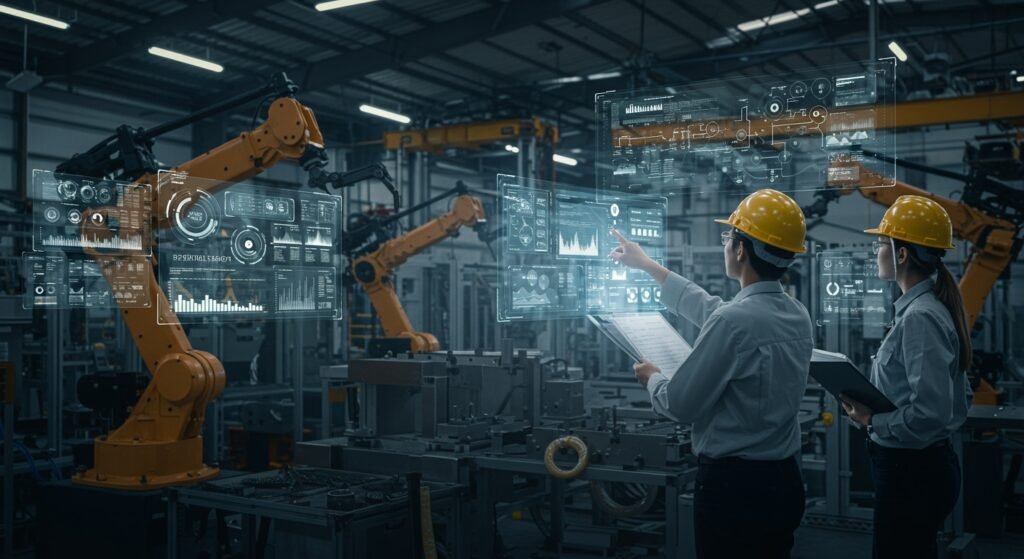Industrial Engineering in Smart Manufacturing: 7 Essential Ways It’s Revolutionizing Production
The landscape of manufacturing is undergoing a profound transformation, driven by digital technologies, automation, and data-driven insights. At the heart of this evolution is the critical role of Industrial Engineering in Smart Manufacturing. Industrial engineers, traditionally focused on optimizing processes, improving efficiency, and reducing waste, are now indispensable architects of the factory of the future, leveraging smart technologies to unlock unprecedented levels of productivity and innovation.
Table of Contents
- Foundations of Smart Manufacturing and IE’s Role
- Data-Driven Decision Making and Analytics
- Automation and Robotics Integration
- Optimizing Smart Supply Chains
- Lean and Agile Methodologies in Smart Factories
- Human-Machine Collaboration and Ergonomics
- Future Trends and the Evolving Role of Industrial Engineering
- Conclusion
Foundations of Smart Manufacturing and IE’s Role
Smart Manufacturing, often synonymous with Industry 4.0, integrates advanced technologies such as IoT, AI, big data, cloud computing, and cybersecurity into traditional manufacturing processes. For industrial engineers, this presents both challenges and immense opportunities. Their core principles of process analysis, optimization, and system design are more relevant than ever, albeit applied to increasingly complex, interconnected systems. They are the bridge between technological potential and operational reality, ensuring that smart investments yield tangible improvements in productivity and quality.
Data-Driven Decision Making and Analytics
In a smart factory, data is the new oil. Industrial engineers are at the forefront of collecting, analyzing, and interpreting vast amounts of data from sensors, machines, and entire production lines. They use predictive analytics, machine learning, and simulation tools to identify bottlenecks, forecast maintenance needs, and optimize resource allocation in real-time. This shift from reactive problem-solving to proactive optimization is a hallmark of modern industrial engineering practices.
Automation and Robotics Integration
The rise of advanced automation, collaborative robots (cobots), and autonomous mobile robots (AMRs) reshapes factory layouts and workflows. Industrial engineers design these integrated systems, ensuring seamless communication between different automated components and optimizing the human-robot interface. Their expertise is crucial in maximizing the efficiency of automated processes while maintaining flexibility and safety.
Optimizing Smart Supply Chains
Smart manufacturing extends beyond the factory walls to the entire supply chain. Industrial engineers apply their principles to create resilient, transparent, and efficient supply networks. This involves leveraging digital twins, blockchain, and advanced planning systems to optimize logistics, inventory management, and supplier relationships. For example, understanding the intricacies of a global supply chain requires robust supply chain management strategies.
Lean and Agile Methodologies in Smart Factories
While smart manufacturing introduces new technologies, the foundational principles of Lean Manufacturing remain vital. Industrial engineers combine the power of data-driven insights with lean methodologies to eliminate waste, improve flow, and enhance value creation in smart environments. Agile principles, traditionally from software development, are also being adopted to enable quicker adaptation to market changes and rapid prototyping in smart production.
| Aspect | Traditional IE Focus | IE Focus in Smart Manufacturing |
|---|---|---|
| Process Optimization | Manual time studies, line balancing | Real-time data analytics, AI-driven simulations |
| Quality Control | Statistical process control (SPC) | Predictive quality, machine vision systems |
| Layout Design | Static fixed layouts | Dynamic, reconfigurable, modular layouts |
| Maintenance | Reactive/Preventative | Predictive maintenance using IoT sensors |
| Decision Making | Experience-based, historical data | Data-driven, AI-assisted, real-time insights |
Human-Machine Collaboration and Ergonomics
As machines become more intelligent, the role of human workers evolves from manual labor to supervision, decision-making, and specialized tasks. Industrial engineers design work systems that foster effective human-machine collaboration, considering ergonomics, safety, and training needs. They ensure that technology empowers rather than displaces, enhancing worker capabilities and job satisfaction.
Future Trends and the Evolving Role of Industrial Engineering
The future of Industrial Engineering in Smart Manufacturing is dynamic and promising. Emerging trends include the increasing adoption of generative AI for design optimization, the growth of edge computing for real-time processing, and the development of more sophisticated digital twins that can simulate entire factory lifecycles. Industrial engineers will continue to be critical innovators, constantly re-evaluating and re-designing systems to harness new technologies effectively. Their ability to integrate technical solutions with organizational objectives will be key to unlocking the full potential of future manufacturing landscapes. For more insights into these developments, consider exploring resources from organizations like the Institute of Industrial and Systems Engineers (IISE).
Conclusion
The symbiotic relationship between Industrial Engineering and Smart Manufacturing is undeniable. Industrial engineers are not just adapting to the smart factory; they are actively shaping it, ensuring that technological advancements translate into practical, efficient, and sustainable production systems. Their analytical prowess, problem-solving skills, and holistic systems thinking make them indispensable in navigating the complexities and opportunities of the Fourth Industrial Revolution, driving industries towards a more productive and resilient future.


